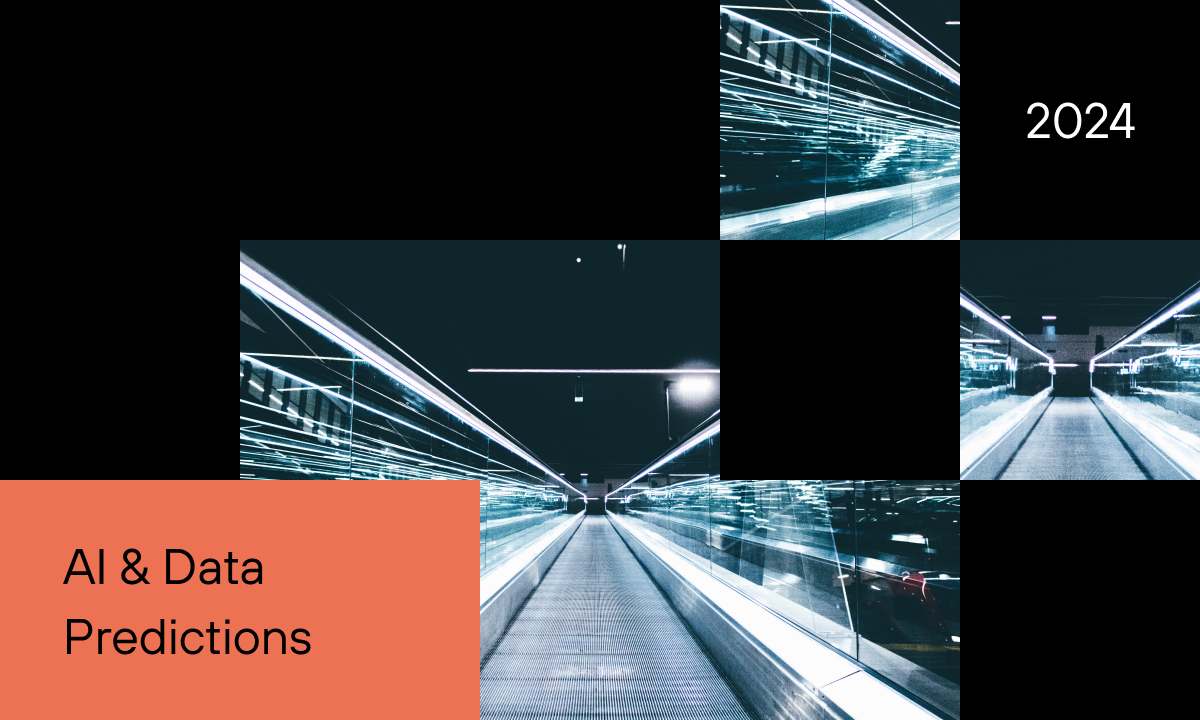
As we wrap up a truly transformative year for AI, it’s an irresistible opportunity to look forward into 2024 and beyond. Between our networks of AI practitioners, enterprise buyers, not to mention the dozens of Zetta startups blazing trails, we culminated our on-the-ground observations and market insights to share our AI (& data) predictions for the next year:
1) Year of AI-native Applications - This will be the year entrepreneurs move on from “thin AI wrapper” applications and dive headfirst into the creation of AI-native applications. We foresee a rise in businesses that leverage proprietary data, unique feedback loops, built-in agents, and AI-native interfaces. Rather than competing with existing software products, these startups will enhance or disrupt human-labor-centric activities, such as drug design in life sciences (e.g. Nabla), professional services like IT integrations or compliance auditing, or supplement teams with agentic co-workers.
2) LLMs Reimagine the Data Stack - We believe that LLMs will meaningfully transform the data stack. These transformative models will elevate the efficiency of diverse data professionals by fostering collaboration and automating tasks that were traditionally manual—particularly those demanding considerable effort, domain expertise, and time. Beyond serving as copilots for routine tasks, LLMs will unlock innovative capabilities, such as Data Spelunking (disambiguating data, semantic similarity, entity resolution), validating unstructured data quality, and optimizing queries, among other advancements. If you're eager to explore how LLMs will revolutionize the workflows of various personas, delve into our article.
3) New Data Primitives will Unbundle the Data Stack - New data primitives will help unbundle the data stack. Enterprises are increasingly storing their data in S3 or R2 rather than centralizing it all in the warehouse. We already have examples of how new data primitives are enabling this movement, for example:
- DuckDB uses serverless OLAP to turn your laptop into a personal analytics engine
- Iceberg builds neutral storage on top of the lake to help every query layer perform its best
- Gable introduces data contracts to ensure data quality at source rather than an afterthought.
4) Rise of the Robots - We will see a renewed interest in robotics and autonomous systems. The rise of vision transformers, multi-modal foundation models and model-based reinforcement will improve AI's understanding of physical reality and ability to reason in real-world outdoor environments. For instance, companies like Electric Sheep Robotics have built a multi-modal AI agent that uses real-world data, reinforcement learning (RL) and task planners to create a better understanding of localization, 3D awareness, semantic traversability and mapping, thereby transforming outdoor automation..
5) New Forms of Feedback (RL’X’F) on the Block - In 2023, Reinforcement Learning from Human Feedback (RLHF) has proven surprisingly effective for aligning models towards general human preferences. However, RLHF is expensive, time-consuming and difficult to scale in specialized domains. We expect to see new forms of interactive feedback emerge for domain-specific tasks and non-sensory data like RL (Reinforced Learning) through AI Feedback, RL through Experimental Feedback, RL through Expert Feedback and more. We will see a new wave of startups address these challenges for enterprises training and fine-tuning their models.
6) Bottom-up outpaces top-down AI adoption across the board: While there are top-down directives from boards and execs to embrace AI, the fastest adoption of LLMs in 2024 will come from grassroots levels. Technical and non-technical professionals alike are AI-curious and in 2024 they will move faster than central IT teams to experiment with and adopt AI-powered tools to enhance their productivity, reduce workloads, and over-achieve their goals. In many sectors, adoption will be driven directly from individuals and hearken back to the early Saas “Shadow IT” days.
7) New AI-native Business Models Emerge - As AI agents take center stage, pricing models will transition from traditional models, such as annual subscriptions or consumption-based models, to outcome-based approaches. The immediate ROI is evident as these AI agents efficiently reduce the necessity for hiring or outsourcing, elevating workforce capabilities and productivity to enhance profit margins. Looking ahead, the long-term ROI extends to the potential impact on the top line, driven by the continuous availability of these agents, contributing to business expansion around the clock..
8) RAG evolves from Semantic Similarity to more sophisticated approaches - Though semantic similarity is the current consensus-based approach, it doesn’t work optimally for all RAG use cases. The approach will evolve from semantic similarity towards ontology-based representations (e.g. graph networks) over the next 12-24 months. For example, representing a code base in a graph ontology captures the relationships between embedded and/or interconnected functions in a way that cosine similarity likely doesn’t..
9) The First Autonomous Crime - While auto-regressive LLMs may have limitations in comprehending generated content, specialized AI agents exhibit a higher level of understanding, intentionality, and capability to execute tasks with specific objectives in mind. As the guardrails surrounding these agents continue to evolve, enhancing their robustness, reliability, and responsibility, it seems more likely than not that there will be at least one high-profile incident of unintended consequences from an agent pursuing a desired outcome and both planning and executing criminal tasks to get there.
10) Global AI Oversight Organization (akin to WEF or UN) will be established - We anticipate the establishment of a formalized global regulatory initiative, akin to entities such as the WEF or UN, by the end of the year. The ongoing international conversations underscore the imperative for concerted efforts in coordinating AI regulations across nations, providing a promising outlook for the development of a unified framework.
While this year has seen rapid and unexpected breakthroughs in AI, they have set the stage for diverse advancements poised to redefine industries, workflows and global governance in the coming year.